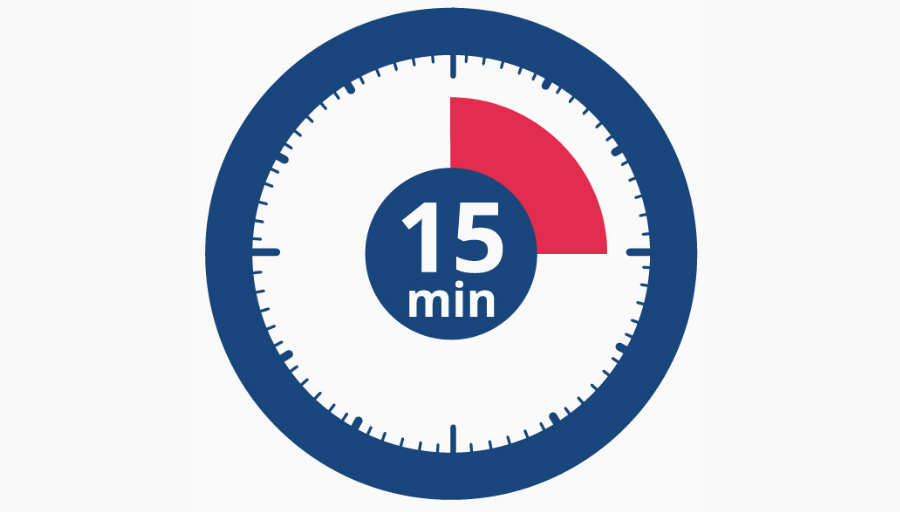Like many writers J.P. Choquette thought she didn’t have enough time to write a novel. There were many reasons: she was too busy, too tired, her ideas weren’t good enough. Sick and tired of her excuses she committed to writing for just 15 minutes a day. She shares how she did it and what happened.
I watched the blades of the box fan swirl around and around. My brain felt the same. I sighed, pushed my bangs away from my face, and re-read the paragraph I’d just written. A sickening feeling lodged itself in my belly as I shook my head. This story was stupid. I shut down the computer.
What was the point of trying to finish this novel anyway? I knew where it would end up: partially written, then abandoned on the hard drive. Just like the others that sat there, waiting for me to be inspired enough to finish them.
What was wrong with me? Why couldn’t I ever finish what I started? And how could I let my biggest dream—being a published author—keep slipping from my fingers?
The beginning of a writing dream
I’d loved writing since childhood when I was big enough to create “books” with misspelled words and disconcerting pictures of what was supposed to be sheep, rainbows, and chocolate, my favourite interests at the time. It was fun making the movies in my head come to life on the page—that’s what writing had always felt like to me.
But somehow in adulthood, I couldn’t tap into that same joy. Or rather, I couldn’t maintain it long enough to complete a significant project…like a book. There were many reasons for this, I told myself.
- There’s not enough time
- The middles are too tough to figure out
- I’m too tired after work and can’t get up any earlier
- Shiny new ideas are more fun
- I don’t know what I’d do with the novel even if I finished
- No degree in English
The list went on and on.
>> Read more: How to make time to write – 4 approaches to finding time in busy schedules
When you want to write a book but can’t
If you’re a writer, chances are you can relate to one or more of the reasons mentioned above. Chances are too, that you believe somewhere deep down that you simply can’t finish writing a book. Other people can, but not you.
I believed that for a long, long time. Until I found a method that worked. Now, many years later and with several published novels under my belt, I know that you can do this. You can write a novel from start to finish, using these three simple steps.
Step one: write for 15 minutes most days of the week
If you’re tired of the “To Be a Successful Author You Must Do XX” articles in popular writing publications, I understand. I’ve tried long and hard to fit my square self into a round hole without success.
The beauty of this writing process is that it’s super simple and unintimidating.
Here’s what you do: write for 15 minutes, most days of the week. Everyone reading this is likely in a different life situation, so a mandate that you must rise before five o’clock a.m. and write for an hour or use every lunch break to pound out words isn’t practical.
Instead, keep it simple and easy. Just slip in 15 minutes of writing time five or six days of the week, four if needed. Or combine your 15-minute sprint with one of these other approaches to create a successful writing practice.
“What can I possibly accomplish in just 15 minutes a day?” you might wonder. The answer is a lot. I’ve used this method to write most of the books I’ve published. The words add up faster than you think. And because you aren’t dreading marathon writing sessions or feeling queasy at the thought of trying and failing to live up to high expectations, you won’t quit. Like exercise or other healthy habits, the hardest part is usually getting started.
>> Read more: Prioritize your writing – make writing matter and make it happen
Step two: don’t read what you wrote
This is a hard one for most people. It was for me. Heck, it still is for me. The reason it’s important though is that when you write you’re using the right side of your brain. When you edit (reading back over what you wrote always brings out the editor) you’re using the left side of your brain.
When your editor gleefully takes over, it will begin to do a few things in rapid succession.
- Point out all the typos and dumb mistakes you made
- Chuckle at how pathetic your prose sounds compared to your favorite author’s work
- Leave you feeling too bruised to keep going
Instead, I’ve found that re-reading only the last paragraph or two I wrote, helps re-center me in the story. If you’re an outliner, you can refer to your outline. If you’re an intuitive writer or panster, you can use those paragraphs to find your groove again.
Another option is to leave yourself a little note directly in the manuscript or on a sticky note nearby that says what will happen at your next writing session. For example, “Add coffee shop scene here,” or “fight between Charlotte and Brian” is effective for jumpstarting your memory.
Not going back to re-read your work can be uncomfortable. Still, I encourage you to try this for one month and see if it increases your forward momentum.
>> Read more: How to keep writing using rewards
Step three: be consistent
Life happens. You’ll miss a writing session due to oversleeping, a child or pet getting sick, a pressing deadline at work, the need to recharge after a long and exhausting work week. Just be as consistent with your writing practice as you possibly can. Grab those tiny bits of time to write wherever you find them.
Remember: it’s only 15 minutes a day. You can squeeze that in more times than not. If you wrote for that length of time five days a week, you’d reach an hour and a quarter. In a month you’d be at five full hours. Not much, you say. Well, how many hours did you write in the past month? The past year?
Small steps can equal huge results if you stay consistent and don’t give up.
[et_bloom_inline optin_id=optin_7]



